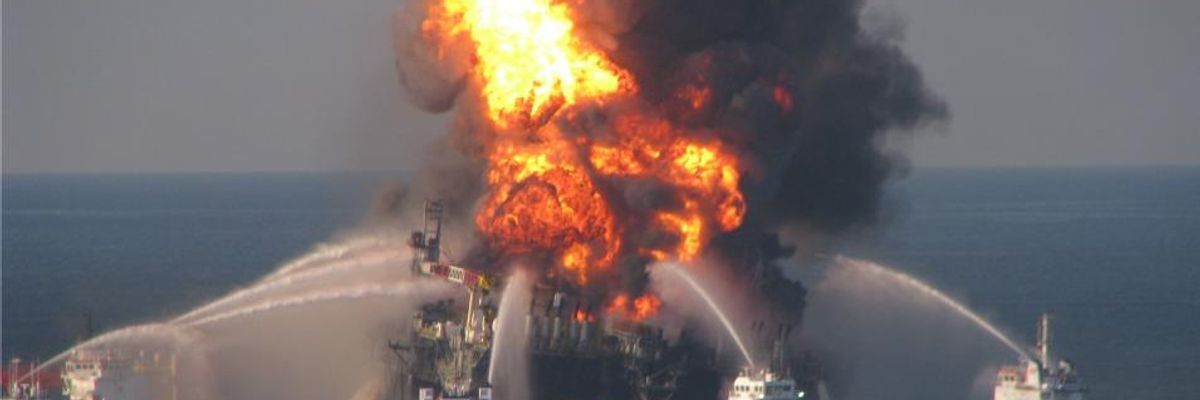Despite BP's claims that the Gulf of Mexico is making a robust recovery in the wake of 2010's Deepwater Horizon disaster, an annual study of the ecosystem and its inhabitants shows that the effects of the catastrophic explosion and subsequent oil spill are still being felt--and in many cases, are not yet fully understood.
April 20 will mark the five-year anniversary of the largest marine oil spill in U.S. history. And as the National Wildlife Federation notes in a report released Monday, "wildlife are still struggling" to rebound throughout the region's deep waters, sandy beaches, lush wetlands, and coral reefs.
Among the findings detailed in NWF's Five Years and Counting: Gulf Wildlife in the Aftermath of the Deepwater Horizon Disaster (pdf):
- In 2014, dolphins on the Louisiana coast were found dead at four times historic rates, and there is increasing evidence that these ongoing dolphin deaths are connected to the 2010 oil disaster.
- Twelve percent of the brown pelicans and 32 percent of the laughing gulls in the northern Gulf are estimated to have died as a result of the BP oil spill.
- Oil and dispersant compounds have been found in the eggs of white pelicans nesting in three states--Minnesota, Iowa, and Illinois.
- Exposure to oil has been shown to cause abnormal development in many species of fish, including mahi-mahi, Gulf killifish and bluefin and yellowfin tuna.
- Coral colonies in five separate locations in the Gulf--three in the deep sea and two in shallower waters--are showing significant oil damage.
- Oil has been found in sediments deep in the Gulf of Mexico, in a 1,200-square-mile area surrounding the wellhead.
"It may take years or even decades before the full impacts are known, and more research is clearly needed," reads the report. "In the meantime, restoration of the Gulf ecosystem must become a high priority for the nation."
The NWF's report directly contradicts the sunnier outlook BP is attempting to project.
As the Guardian notes, "Over the last month, the company has released PR materials that highlight the Gulf's resilience, as well as a report compiling scientific studies that suggest the area is making a rapid recovery."
That company-funded report (pdf) claims, in its introduction: "Areas that were affected are recovering and data BP has collected and analyzed to date do not indicate a significant long-term impact to the population of any Gulf species."
But environmentalists have dismissed those claims as corporate spin primarily aimed at reducing the fines and penalties the corporation is required to pay. In court papers filed last week, BP claimed that fines above $2.3 billion--less than a fifth of the environmental penalties U.S. prosecutors want the company to pay--would drain its U.S. oil business of available cash this year.
"We've had enough of reacting thoughtfully to BP's continued PR efforts to discredit the scientists and environmental groups working to restore the Gulf and honor the lives and livelihoods lost in this disaster," the Ocean Conservancy declared in a blog post responding to the BP report.
Meanwhile, the Gulf Restoration Network is calling on BP to "stop its campaign of denial, deception and obstruction, and finally come clean."
"Four years after the 2010 drilling disaster, as the ongoing impacts of Deepwater Horizon become more and more apparent, it is appalling and unjust that BP is funding a PR campaign to misrepresent the true impacts of the catastrophe," reads a public petition at the Gulf Restoration Network website. "BP may be willing to challenge scientific studies, claim 'active cleanup' is over, and downplay the tarballs and tar mats that continue to show up along the Gulf coast, but the voices of the Gulf and the nation will not be silenced."
